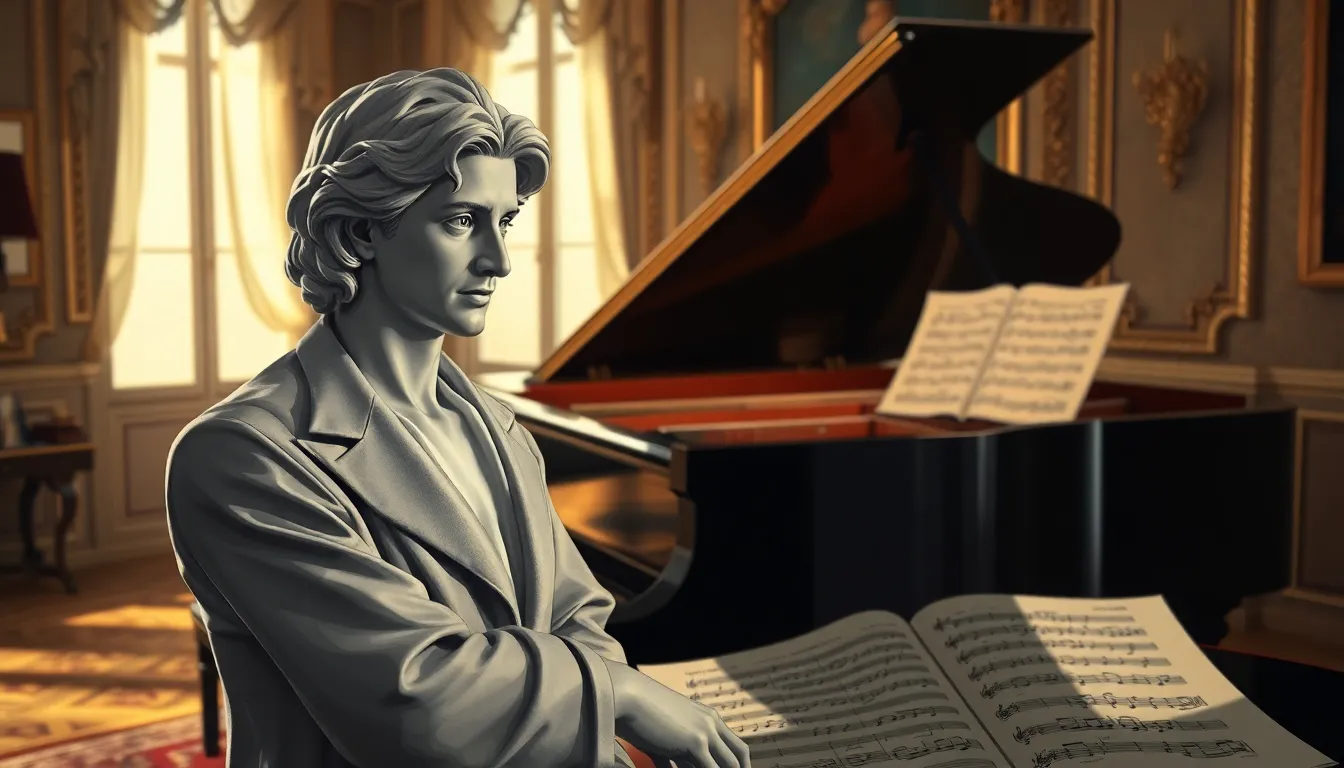Table of Contents
ToggleIn a world where emotions run wild and passion knows no bounds, Romantic composers took center stage, crafting melodies that could make even the toughest heart melt. They didn’t just write music; they painted with sound, capturing the essence of love, longing, and the occasional existential crisis. If you’ve ever found yourself swooning over a symphony or tapping your foot to a rhapsody, you’ve felt the magic these musical maestros wielded.
From the dramatic flair of Chopin to the lush harmonies of Brahms, the Romantic era was a playground for creativity and expression. These composers didn’t just break the rules; they threw them out the window and danced in the rain of their own genius. Join us as we dive into the captivating world of Romantic composers, where every note tells a story, and every symphony is a love letter to the human experience.
Overview of Romantic Composers
Romantic composers significantly shaped the landscape of Western music from the late 18th century to the early 20th century. This era featured a departure from the structured forms of the Classical period, allowing composers to explore personal and national identities. Notable figures include Frédéric Chopin, whose piano works embody the essence of longing and nostalgia, and Johannes Brahms, who perfected complex harmonic structures.
Emotional depth typified the music of this period, with composers drawing inspiration from literature, nature, and personal experiences. Pyotr Ilyich Tchaikovsky infused his compositions with passionate melodies and dramatic contrasts, often reflecting his innermost feelings. Meanwhile, Franz Liszt revolutionized piano playing, promoting virtuosic techniques that pushed the boundaries of musical expression.
Composers created expansive symphonies, exquisite operas, and captivating chamber works. The orchestral piece “Symphonie Fantastique” by Hector Berlioz exemplifies this innovation, showcasing a programmatic approach that tells vivid stories through music. Additionally, Gustav Mahler’s symphonies exemplify the grandeur and emotional weight characteristic of Romantic music.
Connecting with listeners became a prominent goal for these composers, fostering a deep emotional response. The use of innovative harmonies and expanded forms led to an enriched aesthetic experience. Each composition allows a unique insight into the human soul, transforming music into a profound narrative art form.
Ultimately, Romantic composers contributed vastly to the evolution of music, leaving an indelible mark on the cultural heritage of the world. Their bedrock legacy continues to inspire musicians and audiences alike, reinforcing the timeless nature of their artistry.
Key Characteristics of Romantic Music

Romantic music stands out for its emotional depth and expressive power. Composers infused their works with personal feelings, creating a profound connection with listeners.
Emphasis on Emotion
Emotion serves as a cornerstone of Romantic music. Composers like Chopin and Tchaikovsky convey intense passion through their melodies. Music evolves into a vehicle for storytelling, reflecting love, despair, and longing. Tonal colors and dynamic contrasts enhance the emotional experience, allowing listeners to feel the nuances of each composition. Composers often utilized expanded harmonies, adding complexity and richness to their works. The focus shifts from technical precision to the exploration of human sentiments, making each piece resonate with audiences on a personal level.
Individualism and Nationalism
Individualism flourishes in Romantic compositions, where personal expression takes center stage. Composers embraced their unique voices, pushing boundaries to establish distinctive styles. Nationalism also plays a crucial role, with many composers drawing inspiration from folk melodies and cultural themes. Tchaikovsky’s works often incorporate Russian folk elements, while Smetana celebrates Czech heritage in his operas. Composers sought to express national identity through music, reflecting the political and cultural landscapes of their times. Each work captures the spirit of its origin, making Romantic music a rich tapestry of diverse influences.
Notable Romantic Composers
Romantic composers such as Franz Schubert, Johannes Brahms, and Pyotr Ilyich Tchaikovsky played pivotal roles in shaping the music of their time. Their unique styles and emotional expressions continue to resonate with audiences.
Franz Schubert
Franz Schubert transformed the song cycle with compositions like “Die schöne Müllerin” and “Winterreise.” His ability to blend poetry with music created profound emotional landscapes. Melodies often display exquisite lyrical beauty, revealing deep human emotions. Schubert’s symphonic works, including “Unfinished Symphony,” showcase his innovative orchestration and harmonic exploration. Additionally, he laid groundwork for future composers, influencing the development of art song.
Johannes Brahms
Johannes Brahms blended complexity with deep emotional expression. His symphonies, particularly the First Symphony, illustrate a commitment to traditional forms while embracing Romantic emotional depth. Melodic richness and intricate counterpoint characterize his work. Brahms’ choral and vocal compositions, such as “A German Requiem,” exemplify his ability to convey profound spirituality. He redefined chamber music, creating enduring masterpieces that resonate with audiences today.
Pyotr Ilyich Tchaikovsky
Pyotr Ilyich Tchaikovsky’s music captures intense emotion and vivid imagery. His ballets, including “Swan Lake” and “The Nutcracker,” showcase innovative narratives and memorable melodies. Tchaikovsky’s symphonic works, like the “Romeo and Juliet Overture,” exhibit dramatic contrasts and lush orchestration. Passionate themes reflect personal struggles and triumphs, connecting deeply with listeners. His contributions to opera, particularly “Eugene Onegin,” further highlight his masterful ability to evoke complex human experiences.
Impact of Romantic Composers on Music Today
Romantic composers transformed the landscape of Western music, leaving an indelible mark that continues to resonate. Their emotional depth and innovative techniques created foundational elements present in contemporary music. Chopin’s expressive piano works and Tchaikovsky’s dramatic compositions showcase the power of emotion in melody, influencing generations of musicians.
The emphasis on personal expression opened doors for diverse genres. Jazz, pop, and film music often incorporate the emotional language developed by Romantic composers. Liszt’s virtuosic piano style inspired pianists by encouraging technical prowess combined with emotional expression. Similarly, Mahler’s expansive symphonic forms paved the way for modern orchestration.
Composers expanded harmonic palettes, enriching musical landscapes. The rich textures found in Brahms’ symphonies still inform contemporary orchestration and arrangement practices. Nationalism in Romantic music also encouraged artists today to explore cultural identities within their work, creating connections that reflect a global musical landscape.
Folk themes continue to thrive as composers draw inspiration from local traditions. The blending of cultural motifs has originated from the pioneering work of composers like Dvořák and Smetana. The very fabric of popular music reflects the Romantic influence, where yearning, passion, and personal stories remain central to songwriting.
The legacy of Romantic composers also thrives in education. Their compositions serve as essential repertoire for musicians, inspiring them to delve deep into emotional expression. Each performance invites audiences to connect, showcasing the timeless nature of these works and their relevance in nurturing creativity across musical disciplines.
Ultimately, the impact of Romantic composers remains profound, shaping the emotional narrative of music and enriching the listening experience. Their artistry continues to inspire musicians and connect with audiences, affirming the enduring power of their contributions.
The legacy of Romantic composers remains a powerful force in the music world. Their ability to weave emotion into every note has created a timeless connection with listeners. By pushing boundaries and embracing personal expression they transformed music into a profound narrative of human experience.
As their innovative techniques and emotional depth continue to influence modern genres the enchanting melodies of the Romantic era will always resonate. Each composition stands as a testament to the enduring power of music to evoke feelings and tell stories. The world of Romantic music invites everyone to explore its rich emotional landscape and appreciate the artistry that shaped the course of musical history.




